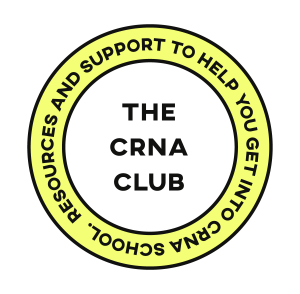If you've landed a CRNA school interview, congratulations! That is a huge accomplishment. If you're just here doing some research, great job, you are getting your ducks in a row and you're going places, friend. Let's discuss the four types of interview questions that we know you'll get asked and give you some real examples from actual CRNA school interviews.
The 4 Types of Questions:
- Emotional Intelligence (EQ)
- Pathophysiology
- Pharmacology
- “IDK” questions
1. Emotional Intelligence CRNA School Interview Questions
Assessing your emotional intelligence is high on the admissions committees' to do list. Why is that? The operating room is an extremely stressful place. You're dealing with big personalities, in life or death situations. You're at the head of the bed and you have to be able to advocate for your patients in a professional yet assertive manner. Sometimes that means speaking up against what the surgeon is demanding. Sometimes that is canceling a case on a patient who is extremely upset and inconvenienced. Sometimes that is confronting a colleague who made an error that jeopardized the safety of patients or staff.
We all know that working in healthcare is getting more difficult by the day. Staffing ratios barely even exist anymore, and budgets are getting smaller and smaller. Everyone feels it. The patients feel it. How you respond to stressful and critical situations is one of the biggest questions programs try to answer.
Here are some example of real EQ questions:
- Tell us about a time you had a conflict with a person in an authority position?
- Tell us about a time you made an error?
- Tell us about a time you dealt with a colleague that was uncomfortable?
2. Pathophysiology CRNA School Interview Questions
One of the biggest reasons that admissions faculty or going to ask you pathophysiology questions is they want to assess your ability to think and explain clearly under pressure. Also they want to gauge your level of understanding of complex pathophysiologies. Are you giving them surface-level answers? Or are you giving them answers that show that you know what happens at the cellular level? They're also trying to gauge - do you understand what's actually happening with your patients in the ICU who have multi organ system failure? Can you really explain what's happening when the patient develops oozing from their line insertion sites, or why they are exhibiting decorticate posturing? Furthermore, can you explain it in a way someone else can understand (without rambling on and on)?
Examples of pathophysiology questions:
- Describe how CRRT works and why it’s used
- Describe the EKG changes observed in the patient with an anterior MI?
- What are some risks of massive transfusion of blood products?
3. Pharmacology CRNA School Interview Questions
What's one of the biggest things we do as a nurse anesthetist? We administer drugs. We administer a lot of them, and for a ton of different reasons. The reason we give "Patient A" succinylcholine might be completely different than the reason we give "Patient B" succinylcholine. Think about how every single drug you give has a laundry list of side effects. Now, think about those side effects in relationship to different comorbidities and different types of surgical procedures that come with their own list of risks and effects. Choosing the wrong drug, or not fully understanding its effects could be detrimental.
If you get asked pharmacology questions, they will likely revolve around the types of drugs that you will be using in the ICU. So think, what vasoactive infusion are you using? What are the types of vasoactive infusions used in high acuity ICUs? And do your best to understand these drugs as in-depth as possible. Don't just memorize them, try to really understand how they work. Surface-level answers won't work, you need to be explaining clearly and concisely the receptor types affected, what happens when those receptors are activated, dosages, and major side effects. You're also going to need to know what types of drugs are used for what types of patients and why.
Examples of pharmacology questions:
- Describe in detail how Vasopressin works?
- How does Adenosine work?
- Describe the receptor and effects of Precedex?
4. “IDK” CRNA School Interview Questions
AKA “Questions that might stump you.”
There are two subcategories here.
- The types of questions that are a bit over your heard, that you likely won’t know the answer to (and aren’t meant to).
- Questions that are so random and out of left field you are completely caught off guard.
Let’s talk about the first type - the ones that you probably won’t know the answer to (and they know that you probably won’t know but they’re asking anyway).
You are not going to know everything when you're in clinical, let alone as a CRNA. But, the key here is (and what people are trying to assess) is what is your response going to be when you don't know the answer? Are you going to get all flustered and fumble, and clam up? Or are you going to remain calm cool and collected. Is your ego too big to admit that you don't know the answer? Are you going to try to make it up?
Now, the second type, the ones coming in from left field. “If you were a color, what color would you be?” “If you were to buy 10 apples, at $1.25 each, and they were on sale for 30% off, how much would your total be?”
What are they getting at here? It could be a couple of things. They might want to see your thought process and your ability to explain your rationale. They also want to see how you handle something totally unexpected. They also might be trying to figure out if you can think quickly on your feet. The key here is if you are getting one of these left field questions to pick an answer and explain really in-depth your reason for choosing the random thing that you did. Don't just give them a short answer like, well I like the color purple. Tell them more about why the color purple matches your personality, what meaning that color represents, and even what shade of purple. Get creative here you are trying to stand out and show your personality.
Examples of “IDK” Questions
- If you were an animal, what type of animal would you be and why?
- Describe how Cisatracurium is metabolized? (no way you would know this!)
- If you were a car, what type of car would you be?
Acing your CNA school interview is tough. But the key? Preparation. Practice over and over your elevator pitch. Practice saying why you want to become a CRNA. Practice saying why you want to attend to their program. Remember to smile. And also keep in mind that they're human too. They want to connect with you, so don't be a robot. At the end of the day it's impossible to know every single answer. What matters is how you deliver the information that you do know.
(Psst! If you'd like more tips for applying to CRNA School, come check out our FREE class, Getting Into CRNA School 101!)


